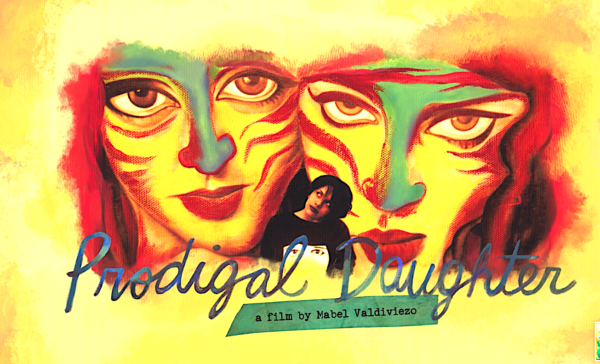
By Robert St. Martin
Los Angeles, CA (The Hollywood Times) 6/3/24 – An interesting documentary at this year’s Los Angeles Latino International Film Festival (LALIFF) is Mabel Valdiviezo’s Prodigal Daughter (in English & Spanish, with subtitles, 2024).
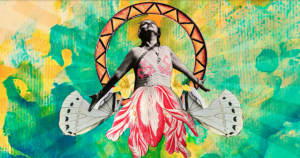
Mabel Valdiviezo is a Peruvian American artist in San Francisco and her film tells the story of her reconciliation with her Peruvian family in Lima after sixteen years as an undocumented immigrant in California. Mabel Valdiviezo grew up in an indigenous family in the Comas shanty town on the slope of Cerro Las Minas in Lima. After fleeing war-torn Peru in the 1990s as a young woman, she headed to the United States and eventually became a talented artist who is very involved in documenting the experience of undocumented immigrants.
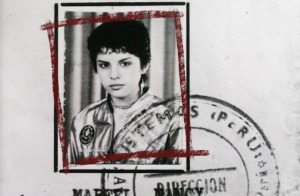
At age 18, she decided to do what many Peruvians were doing – to leave Peru and get out of the civil and political strife inside Peru in 1993, when the Armed Forces of the government of Peru was at still war with the Shining Path indigenous guerillas in much of the county and when Alberto Fujimori was president of Peru. She left Peru and ended up in San Francisco, California on a tourist visa and had hopes of making it as a punk artist.
Mabel endured several traumatizing experiences, depression, and cultural isolation in San Francisco as an undocumented person (after her tourist visa expired) while her family back in Peru knew nothing about her and suffered the consequences of her mysterious disappearance and the years of silence about her very existence.
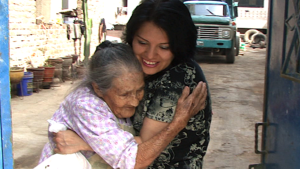
The main focus of the film is on Mabel Valdiviezo’s decision to return to Lima for a family visit after being “disappeared” for sixteen years. Tantamount to this was Mabel’s getting married to a Filipino-American man in San Francisco and that marriage allowing her to finally get a “green card” and no longer be “undocumented.” The return to Peru to see her family is a moving story which Valdiviezo as a filmmaker herself decided to document beginning in 2008. Reconnecting with one’s family is a complex set of events that could have been disastrous but in her case proved to be a transformative experience for her and her family.
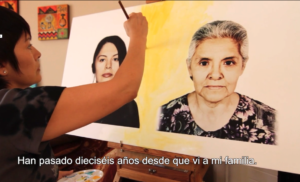
Some 15 years in the making, Prodigal Daughter is a cinematic exploration of family bonds, belonging, and the transformative power of art, giving audiences a slice of life that challenges the prevailing narrative of “good immigrant” versus “bad immigrant.” Because Mabel is an artist, she incorporates her own vibrant photo-paintings into the fabric of the film.
In her own words, she explains: “Art has always been my refuge. Filming and painting my story has helped me to make sense of my journey and heal the bonds with my family and the broken parts inside me. Artistically unifying the film over the course of the story, the artwork becomes a vehicle for empowerment. Vibrant and intimate in execution, it provides the viewer with a sense of the courage that immigrants carry despite the social forces that pull them apart.”
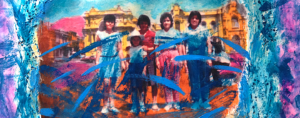
Growing up in poverty, Mabel was a bright student in school and was always encouraged to succeed by her mother who worked as a seamster. Her father abandoned the family at a certain point and married a Japanese-Peruvian woman in hopes of emigrating to Japan (although, like for many Peruvians, this was a scam and he never left Peru).
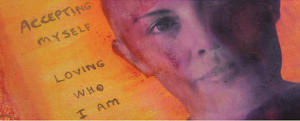
Feeling disconnected from her family, young Mabel pursued artistic and musical interests with the underground Punk Movement in Lima with like-minded friends and centered around the punk band “Los Saicos” and the underground art, music and anti-government political movements that emerged in Peru in the 1980s with the Civil War between the army and the Shining Light indigenous Marxist-Maoist cause.
The government cracked down on artists and intellectuals, arresting many – killing some and leaving others on the long list of “disappeared” persons. In the film, she shares some of the photographs and art of that interesting time in the punk scene in Lima. The nighttime raids on the young people by the military became so frightening that it seemed best to leave Peru.
Her life in San Francisco was difficult and dismal because, as she discovered, there were few opportunities for employment for an undocumented young woman who aspired to be a punk artist. She struggled to build a life of meaning while living on the fringes of society. But she ended up working as a stripper in a North Beach club for a while until that began to take its toll on her mental and physical health.
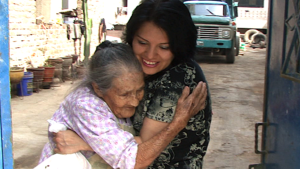
Some years later, she found her way to a better place and marriage to a loving husband and sense of family and security. She was able to blossom as an artist and make several short films including Soledad Is Gone Forever (2006), Counting the Days (2005) and her award-winning Sands of Silence (2016).
Through Valdiviezo’s personal story, the film reveals the struggles of immigrant women living without a safety net and explores their challenges in staying connected with their families left behind. She manages to overcome the hardships of immigration personal trauma, and family isolation in this story of healing and reconciliation. When Mabel Valdiviezo ventures back to Peru on a poignant quest, she uses her art as a bridge between estranged worlds.
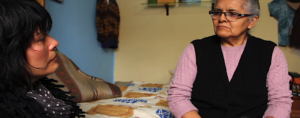
Of course, this results in a whirlwind of emotions, as hidden wounds and buried childhood memories resurface. Her mother Bila’s perception of a selfishly absent daughter adds to an already complex reunion, leading to Mabel’s heartfelt confession of her troubled past marked by addiction and turmoil as an immigrant in the United States.
Her own mother Bila Flores finds her own artistic core and begins painting in Lima and even opens her own tiny studio in a rented space. The sense of connection and forgiveness is so powerful in the film that one cannot help but feel that we all could have better understanding of our own parents. Mabel Valdiviezo hopes that her film will make a difference: “By exploring these issues through an intimate yet transnational lens, Prodigal Daughter ’will offer a space for reflection, dialogue, and community healing, building bridges of understanding among immigrant women, families, advocates, educators, and policymakers.”
Mabel Valdiviezo believes in the importance of healing. She is herself a healer as well as an artist and filmmaker. Drawing on her indigenous Inca roots, she shares what she learned from her grandmother who is also featured in the film – living on her own until her death at age 106. Mabel also includes in her story her own difficult struggle with cancer and how she managed to overcome it in the process of reconciliating herself with her mother Bila, her father, and her younger brother Dante.
Prodigal Daughter is a beautiful film to watch, and its transitions augmented by the artwork integrated into the structure of the film with superb editing by Sara Maamouri. It is Mabel’s hope that her film will have distribution in communities that serve undocumented immigrants – a goal of groups to which she belongs includingBrown Girls Doc Mafia, Undocumented Filmmakers Collective, FWD-Doc, and NALIP.